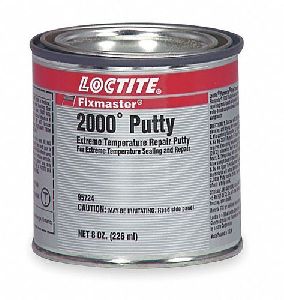
Revive and Restore: Unleash the Power of Metal Putty Filler!
Revive and Restore: Unleash the Power of Metal Putty Filler!
When it comes to repairing and restoring your metal objects, there is one versatile tool that you cannot afford to overlook: metal putty filler. This incredible substance has the power to revive and restore even the most damaged pieces, bringing them back to their former glory. Whether you have a broken pipe, a dented car panel, or a worn-out piece of machinery, metal putty filler is your secret weapon for seamless repairs.
What makes metal putty filler so remarkable is its unique composition. It is a malleable compound that can be shaped and molded to match any surface, making it perfect for filling gaps, cracks, and holes on metal objects of all shapes and sizes. With its exceptional adhesion properties, metal putty filler forms a strong bond with the substrate, ensuring a durable and long-lasting repair.
Benefits of Metal Putty Filler
Metal putty filler offers a range of benefits that make it an invaluable tool for any DIY enthusiast or professional tradesperson. Whether you’re working on small repairs or large-scale projects, this versatile substance can help you achieve impressive results.
Firstly, metal putty filler is incredibly durable. Once applied, it forms a strong bond with the surface, creating a seamless finish that lasts. This means that any repairs or modifications you make using metal putty filler will withstand the test of time, ensuring long-lasting and reliable results.
In addition to its durability, metal putty filler is also highly adaptable. It can be shaped and molded to match the contours of the surface, allowing for seamless repairs or modifications. This versatility is particularly useful when working with intricate or complex surfaces, as the filler can be easily shaped to achieve a precise fit.
Furthermore, metal putty filler offers excellent resistance to various environmental factors. It is inherently resistant to moisture, preventing the formation of rust or corrosion on the treated surface. This makes it an ideal choice for outdoor applications or areas prone to high humidity levels.
In conclusion, the benefits of metal putty filler cannot be overstated. Its durability, adaptability, and resistance to environmental factors make it an essential tool for anyone working with metal surfaces. Whether you’re repairing damaged objects or simply looking to enhance the appearance of your metalwork, metal putty filler is a must-have product.
Application Techniques
In order to make the most of metal putty and its incredible versatility as a filler, it’s important to master some key application techniques. By following these simple steps, you can unlock the true potential of metal putty and achieve exceptional results.
Thorough Surface Preparation:
Before applying metal putty filler, it is crucial to ensure that the surface is clean and free from any dust, dirt, or grease. Use a suitable degreaser or solvent to clean the area thoroughly. This step is essential for achieving a strong bond and preventing any adhesion issues.Proper Mixing:
Metal putty filler usually comes in two components – a resin and a hardener. It’s essential to follow the manufacturer’s instructions for proper mixing ratios. Combine the resin and hardener thoroughly using a clean mixing tool until you achieve a consistent color and texture. This step ensures that the filler cures properly and delivers optimal performance.
metal putty
Precise Application:
Apply the mixed metal putty filler onto the prepared surface using a suitable applicator. Depending on the size and nature of the repair, you can use a putty knife, spatula, or even your fingers. Ensure an even and smooth spread of the filler over the affected area, keeping it slightly leveled with the surrounding surface. Take care to avoid air bubbles or voids during application.
Utilizing these application techniques will maximize the effectiveness of metal putty filler and allow you to achieve professional-quality results. Proper surface preparation, precise mixing, and careful application are key factors in harnessing the full potential of this remarkable product. Embrace the power of metal putty filler and restore various metal surfaces to their former glory!
Tips for Achieving Professional Results
Clean and Prepare the Surface: Before applying the metal putty filler, it is crucial to clean and prepare the surface properly. Use a degreaser or solvent to remove any dirt, grease, or rust from the metal. Wipe it down with a clean cloth or brush to ensure a smooth and even application of the filler.
Mix the Metal Putty Thoroughly: To unleash the full power of metal putty filler, it is essential to mix it thoroughly before use. Use a clean and dry mixing surface along with a suitable tool to combine the filler components evenly. Follow the manufacturer’s instructions for the recommended mixing ratio, usually a 1:1 ratio of hardener to filler.
Apply the Filler with Precision: When applying the metal putty filler, attention to detail is key to achieving professional results. Use a putty knife or spatula to spread the filler evenly over the surface, making sure to fill any cracks, dents, or imperfections. Apply the filler in thin layers, building up as needed, and smooth it out with the putty knife for a seamless finish.
Remember, practice makes perfect when working with metal putty filler. Take your time, follow these tips, and you’ll be able to unleash the power of this remarkable product to revive and restore your metal objects effectively.

